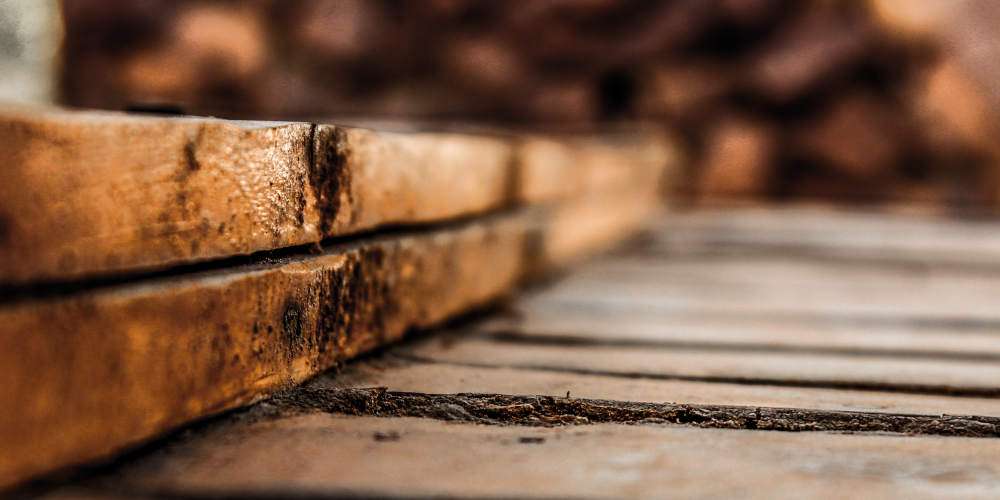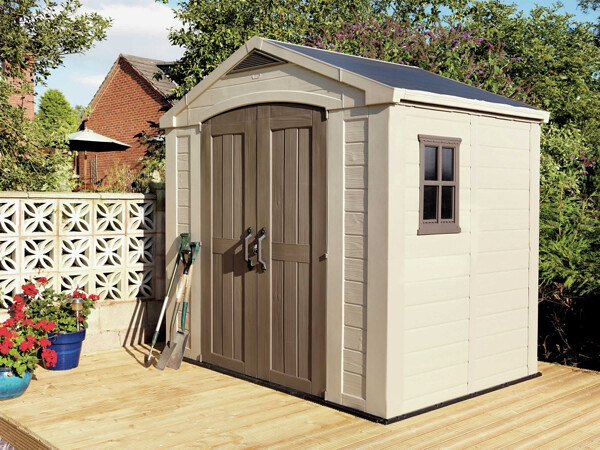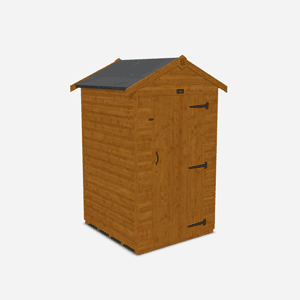Shed Material: Wood vs Plastic vs Metal?
Published: 22/11/2021

Choosing the best material for your garden shed is an important decision.
With so many products to choose from, and various advantages and disadvantages to consider among timber, plastic and metal sheds, we have created this guide to help you understand the fundamental differences between shed materials.
Whether you are prioritising style, durability, or ease of maintenance in your shed material decision, read on to find out what each of the three major shed materials has to offer.
Metal Sheds
The pros
Metal sheds have something of an unfairly poor reputation, perhaps added to by the common image of old tumbledown constructions that have been abandoned.
 Author: Oxyman, via Wikimedia Commons
Author: Oxyman, via Wikimedia Commons
Proneness to rust, construction difficulties and a tendency to overheat in warm weather are among the drawbacks of metal sheds, but there are actually a number of benefits, over and above good value for money, to choosing metal for your shed design.
Metal sheds will not rot and they are not adversely affected by over-exposure to sunlight, so you can place a metal shed in almost any location. Given that it is unusual to come across larger metal sheds, you can usually assemble one quickly and easily, and aside from keeping on top of rust patches you can expect it to last at least 10 years without showing signs of age.
The cons
However, when comparing metal vs wood shed construction, some of the disadvantages of metal sheds begin to emerge.
Most strikingly, metal sheds tend to be less attractive than timber or even plastic sheds. They lack the natural appeal of timber, and don't always compensate for style deficiencies with substance – where a thin gauge metal sheet is used to line a shed, it can feel rather flimsy.
Add to these drawbacks the difficulty of modifying metal sheds and their proneness to rust and corrosion, and it becomes clearer why they tend to be the cheaper option.
Plastic Sheds
The pros
The major selling point of plastic sheds is that they require little to no maintenance. They are also easy to assemble and tend to be quicker to source and deliver than their wooden and metal equivalents.
Choosing a vinyl or high-density polyethylene (HDPE) shed offers you a light, durable material that will not rust or rot, and it is subjected to. Aside from cleaning it every now and again, you won't have to work hard to keep your plastic shed in good nick.

Author: Scott Lewis, via Flickr Creative Commons
The cons
While resin and vinyl sheds are improving in terms of aesthetics, they still struggle to compete with the look and feel of timber. They can also fade noticeably over time in sunlight, and they are also difficult structures to customise and add a personal touch to. Paint is unlikely to bind to a plastic shed, and adding internal shelves and repairing scuffs effectively can be difficult. Plastic sheds are often moulded to look like wood, but these drawbacks raise the question: why not choose the real thing?
When assessing plastic vs wood shed designs, people often raise the issue of security. Weighty timber sheds are often sturdier than plastic alternatives, offering better protection for what's inside. Plastic is not very environmentally friendly, is notoriously lightweight, and there have also been fewer sightings of timber sheds taking flight during heavy storms over the years!
Wooden Sheds
The pros
Timber remains the most popular of the three main shed materials, and it offers much more than just a classic look and feel.
There are various qualities that make timber the best material for garden shed construction, and wood's incomparable aesthetic is one of them. A wooden shed can blend seamlessly into almost any garden and provide a strong, reliable storage and functional space.
Stepping inside a wooden shed, you are greeted with the evocative scent of timber and the atmosphere is usually comfortable given wood's natural regulation of temperature.
There's a timber shed for every budget, with dip-treated timber sheds providing a more affordable alternative to the lower-maintenance option of a hardwearing pressure-treated shed. Our guide to shed treatment might come in handy if you're planning to buy a shed that requires regular protection.
The cons
To get the best from your wooden shed, it needs fairly regular maintenance (so treatment or painting every few years) – but with modest attention well made wooden sheds can last decades, with lengthy timber guarantees up to 20 years. The rewards of an authentic, customisable, sturdy wooden shed are difficult to beat, given that timber sheds are made of natural material and harmonise with your garden environment.
In summary
Every garden is different, and the way you use yours will undoubtedly influence the shed material you opt for, as will your budget. We are passionate about timber and believe that the benefits listed above are worth the time and effort invested in maintaining an authentic wooden shed. For us, and many others, it is a labour of love that yields lifelong rewards.







